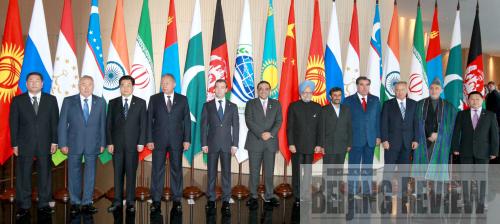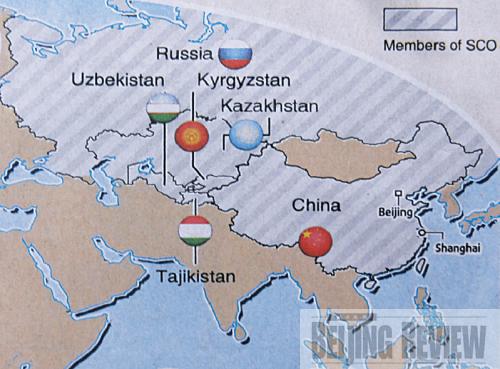|
 |
|
A BIG REUNION: Heads of state from the Shanghai Cooperation Organization (SCO) pose with leaders from the organization's observer states and guests at the annual SCO summit in Moscow on June 16 (PANG XINGLEI) |

Chinese President Hu Jintao addressed concerns about the economic slowdown, regional coordination and new security
threats at this year's summit of the Shanghai Cooperation Organization (SCO) with a series of proposals, including granting a $10 billion credit loan to other SCO members.
"In the face of the international financial crisis, we should bolster confidence, support each other, tide over difficulties in the same boat, make every effort to promote the SCO's practical cooperation in the fields of politics, security, the economy and culture, enhance its competence and properly handle its own affairs," he said in a speech.
Heads of state from all SCO member states—China, Russia, Kazakhstan, Kyrgyzstan, Tajikistan and Uzbekistan—as well as leaders from the organization's observer states attended the annual summit in the central Russian city of Yekaterinburg on June 16.
The SCO held its first special conference on Afghanistan in Moscow in March. Member states agreed with Afghanistan that they would make joint efforts to ban drugs, combat terrorism and crack down on organized crime. SCO defense ministers met in Moscow in April, charting the course for defense cooperation in the next two years.
The SCO currently has four observers—Mongolia, India, Pakistan and Iran. Sri Lanka and Belarus are the first countries to become dialogue partners since SCO leaders adopted the regulations on dialogue partners at their last summit in Dushanbe, Tajikistan.
The Chinese President said China would honor its promises to continue to support bilateral and multilateral cooperative projects within the framework of the SCO. It will send trade and investment promotion missions to these countries to help boost foreign trade and mutual investment among SCO members, he added.
By the end of 2008, China had provided other SCO members with $900 million in concessional buyer's credit to facilitate bilateral trade. Trade volume between China and the other five SCO members increased from $12.1 billion in 2001, when the SCO was founded, to $67.5 billion in 2007, representing an annual growth of 30 percent. By the end of 2007, China's investment in the other five SCO member states totaled more than $13 billion.
Following the summit, SCO leaders signed a series of documents, including the Yekaterinburg Declaration and a joint communiqué.
Five-point Proposal
Chinese President Hu Jintao made a five-point proposal at the recent SCO summit.
First, to strengthen political mutual trust. Member states should make full use of their meeting and consultation mechanisms to promote strategic dialogue, coordinate policies and build consensus. They should work for common prosperity, regional peace and stability and a more just and reasonable international political and economic system.
Second, to deepen economic cooperation. Member states should jointly cope with the impact of the international financial crisis and contribute to the recovery of the world economy. They should enhance coordination in macroeconomic and financial policies, speed up their cooperative projects in the fields of energy, transportation and telecommunications, work closely together to develop emerging industries, and ensure an open and free environment for trade and investment.
Third, to strengthen security cooperation. The document on antiterrorism signed at the summit would enable member states to jointly hunt for and repatriate criminal suspects. The organization should intensify its efforts to fight against drug production and smuggling, devise a framework agreement on combating cross-border organized crime, and implement the consensus that was previously reached among member states on checking money laundering and protecting energy transportation pipelines.
Fourth, to expand people-to-people and cultural exchanges. Member states should strengthen cooperation in the fields of culture, education, public health and tourism. China hopes to work together with other member states on disaster relief and reach agreements with them on the establishment of disaster relief centers as soon as possible.
Fifth, to persist in opening up. China supports the SCO in deepening cooperation with its observers on antiterrorism, drug control, transportation, energy, disaster relief and culture to jointly contribute to regional stability and development. It welcomes Belarus and Sri Lanka as dialogue partners of the organization.
| 